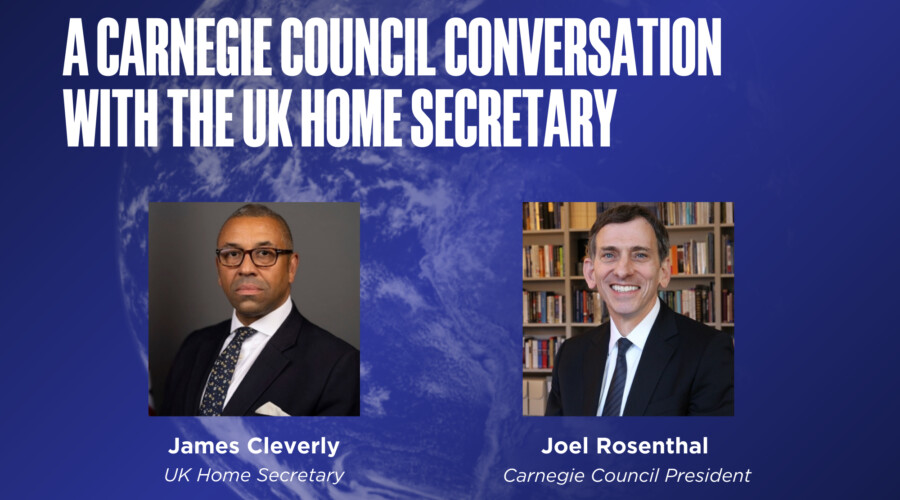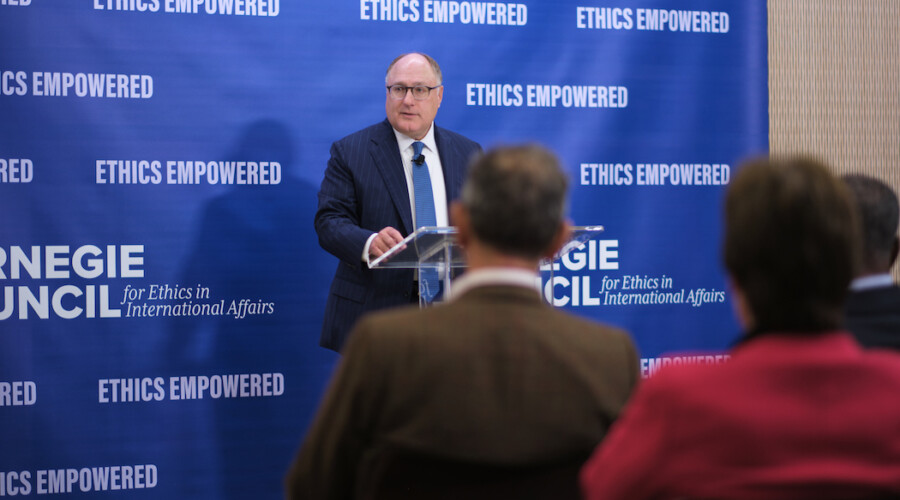Angela Maria Kelley, of the Center for American Progress, talks frankly about the difficult practical and ethical questions surrounding U.S. immigration, and the inconsistent approaches in different states because of the deadlock at the federal level.
JULIA KENNEDY: Welcome to Just Business, a series of interviews on global
business ethics.
Today I'm talking about U.S. immigration policy and ethics with Angela Maria
Kelley, vice president of Immigration Policy and Advocacy at the Center for
American Progress.
Kelley has 20 years of experience in immigration law and policy, and she is
all over the media analyzing the latest developments in the immigration space.
There has been a lot of movement in U.S. immigration policy and it has a potential
impact on business, so let's jump right in. Angela, welcome to Just Business.
ANGELA KELLEY: Thank you so much for having me.
JULIA KENNEDY: Let's start big picture. While immigration law has historically
been more of a federal question, there have been a lot of states and local entities
jumping in. So why have we seen this shift, do you think?
ANGELA KELLEY: The states are jumping in to fill a void. Washington has
failed to act and provide sensible and revised immigration policies, which we
desperately need. In the absence of federal direction, states are taking a range
of actions. Some of these are in my view positive, where states are offering in-state
tuition to undocumented youth who are finishing high school in that state and
want to go on to college. Other measures are very destructive—we've
seen very recently in Alabama, for example, very tough immigration law that
goes as far as requiring kindergartners to have to show papers to go to school.
JULIA KENNEDY: So we've seen this kind of state laboratory idea in education policy,
for example, in the past. What do you think, ultimately? You said there are
positives and negatives. Is this a good development, to be trying these things
out at the state level, or is it really more appropriate at the federal level?
ANGELA KELLEY: I don't think it's a good development overall, particularly
the harsh, negative bills, because it's resulting in—let's just take Alabama
as an example, where you have children who are afraid to go to school; you have
families who are packing up and leaving overnight; you have farmers who expect
to have 50 workers, and five show up. And it doesn't solve our problem of
illegal immigration. So I don't think that's a positive direction.
I understand the frustration that people feel with our broken immigration system.
But for legal reasons, those kinds of laws go too far, because they're encroaching
on what is the federal government's authority. And then, simply for community
safety and stability reasons, I think it's unhealthy for our communities.
JULIA KENNEDY: Let's talk a little bit about your community, Washington, DC, where there's a microcosm of this struggle going on.
ANGELA KELLEY: There is a dysfunctional community, too.
JULIA KENNEDY: Recently, the mayor
of DC has announced that DC police won't check the immigration status of
people stopped for minor offenses. But suburban Prince William County officials
do. Is it confusing to have these two policies close together? What effect does
that have on the community?
ANGELA KELLEY: Sure, it's very confusing. You see DC acting as other jurisdictions
have, where they're saying, "Wait a minute." The collateral damage
that is caused by police acting as immigration agents is huge and it affects
everyone, where you see that a victim of domestic violence is afraid to call
the police to seek protection from her batterer because she's afraid that the
police are going to ask about her immigration status, her child's, or her mother's.
You know, as I always like to say, it's not like all the undocumented people
live in one apartment building by themselves. These are very complex relationships.
We have families with mixed status.
So you see DC acting, I think, in a way that is really meant to protect the
safety of all the residents of the District of Columbia.
Other jurisdictions, coming under pressure, frankly, from the Department of Homeland Security, are going in a different direction. They are having their local police run fingerprint checks as soon as they come in contact with anyone and
put a detainer on a person and hand them over to DHS. It is causing people to just be afraid—afraid to drive,
afraid to go on the street.
So it's very dysfunctional. You can't have such a patchwork of policies and
expect there to be coherence. There isn't.
JULIA KENNEDY: You brought up DHS. What have you thought about the direction
of the Department of Homeland Security under Obama,
because there has been a shift, right?
ANGELA KELLEY: There has been a shift. Obama is in the third year of his
term, and he has deported a million undocumented immigrants. Bush
didn't achieve those numbers in two terms. It's not, I think, what most people
expected from this president. So he has really put his foot quite heavily on
the enforcement gas pedal.
There have been other changes that I view as more positive. There aren't the
large-scale SWAT
[special weapons and tactics]-style raids that there once were. You do have
also more employers who are being held to account for hiring unauthorized workers
and being fined.
But, on balance, in the absence, again, of federal legislation, when you have
enforcement policies on steroids and no coherent legislation coming forward
to really fix the problem, it creates an imbalance, and that's what we have
right now.
JULIA KENNEDY: What about the issue of prosecutorial discretion, which means
that DHS and federal attorneys pick and choose which undocumented immigrants to prosecute
based on how much of a threat they are to U.S. security?
ANGELA KELLEY: Prosecutorial
discretion is really right out of law enforcement 101. It's not like some crazy novel idea. It simply says that any law enforcement
agency has to make wise decisions about how they use resources—where you
make the arrest, where you don't; where you prioritize a deportation, in this
case.
We have a backlog of 300,000 cases. That's not good for anybody. So I think
the idea behind the guidelines and the announcement—which we have yet to
see the details of—is to prioritize and to really try to go after the worst
of the worst, and not the best and brightest.
It stemmed, in part, from a lot of attention to youth who would have been protected
by a piece of legislation called the DREAM
[Development, Relief, and Education for Alien Minors] Act, designed to protect young people who
have really grown up in this country, who don't have ties to any other country,
and who are American in all but a piece of paper.
As you hear about those folks being deported, it just doesn't make sense. I
think it's the administration's effort to try to prioritize more sensibly.
JULIA KENNEDY: Does the effort go far enough or is it kind of a band-aid?
ANGELA KELLEY: I give the idea an "A." But I have to give the execution of
it an incomplete, because we just don't know what it's going to look like. The
administration announced it on August 18, and here we are in late October and
we have nothing to really show for it.
Overall as an idea, in the absence of legislation, again, I do think it makes
sense. Even if we had legislation, you would still have prosecutorial discretion,
you would still have people who would be removable, and we need to make wise
choices about where we put resources to remove those people.
I would like to see the policy go into effect. I do want people who mean
to do us harm, who commit crimes, to be removed from our community, and I don't
want people who have longtime roots in this country, especially the youth, to
be removed. I don't think that does anyone any good.
JULIA KENNEDY: Let's talk a little bit about the DREAM Act. That is another act that has been stalled repeatedly at
the federal level, and some states, such as California, are adopting it. Do
you think that's good, to show what the DREAM Act can achieve, or is it dangerous
again to do it at this patchwork level?
ANGELA KELLEY: "The DREAM Act" is such a smart label that states
have taken on, but they're not actually passing the federal DREAM Act. Let me
just explain the difference. The federal DREAM Act would say for a young person
who has been here for at least five years and isn't older than—I think
the age is 30, maybe younger—that they have to finish high school, and
then they have to either finish two years of college or military service. And
after a ten-year period of being in a conditional status, they can get permanent
residency and eventual citizenship. It's a tough bill, and as you point out,
it has not passed at the federal level.
What the states have done—12 states in all, including California, but even
states like Utah and Texas, interestingly—what those states have said is,
"We can't do what the federal DREAM Act does. We can't give you eventual
residency or citizenship; that's really only up to federal government. But what
we can say is if you are a high school student who is finishing Austin High
School, and you otherwise are completely eligible to go,
you may apply and you may get in-state tuition."
Maryland has a similar law, for example, as do about a dozen states.
Unfortunately, the only thing that states can do is that they can ensure their
residents get a chance at an education. It's really this idea of investing in
our youth, in the hope that we will have legislation that will permit those
youth to adjust their status at the federal level, be able to work legally and
live their lives out here, and be productive citizens. So it's an investment.
I think it's wise. But it is very limited.
JULIA KENNEDY: Let's talk about whether this is a partisan issue or not. It
seems that there is a perception that Republicans are more conservative on immigration,
and Democrats are more liberal. But, especially in the recent Republican debates,
it's clear that there is a spectrum within the Republican Party. So has this
traditionally broken down along party lines? Is there a change now, that it's
not as partisan?
ANGELA KELLEY: It was once very bipartisan. As
recently as 2006, the Senate, with 23 Republicans supporting it, passed
an immigration bill that would legalize most of the 11 million unauthorized
immigrants. It would have really revamped our laws in a wise way. So you had
23 Republicans supporting it. It was led by John
McCain and, on the Democratic side, by the late Senator Ted
Kennedy.
Those days are gone, I'm afraid. Most of those Republicans have retired or are
just listening to a different drummer on this issue. They have gone a much more
restrictionist way and only talk about enforcement. I think they have lost their
bearings, frankly.
The debates that you see the Republican candidates having, oddly, do focus a
lot on this issue of illegal immigration. I think it's because it plays well
to the base that tends to follow the debates and participate in the primaries.
But I don't actually hear a single candidate talking in a way that would put
forward sensible policies. Nobody is talking about solutions. They are very
much in the sound bite frame of trying to out-tough the other guy, or gal, in
the case of one of the candidates.
It's sad, because I think it's a disservice to the American public. Because
by putting it simply in an enforcement frame, as if
we could build a wall high enough, or a fence—and electrify it—according
to candidate Cain—we
would somehow solve the problem.
We know that's not true. We know we have 11 million people here without status,
65 percent of whom have been here for ten years or longer; they have roots in
this country. We have four million kids where one or both parents are unauthorized.
About 50 percent of undocumented people live—and this is very interesting—with
a partner; they live as a couple, with a minor child, so they live in a family
unit.
That isn't the image that so many people have of the unauthorized young Mexican
male scaling a fence or going under a fence. Those days are gone, frankly, those
days are gone.
In order to get real, what I would love to hear the candidates talk about is,
"What do we do about that population?"
JULIA KENNEDY: When you think about immigration, it's a polarizing issue.
Coming from an ethics background, it boils down to a question of values, right?
ANGELA KELLEY: Yes.
JULIA KENNEDY: That's rhetoric that's really used by both sides. So you have
on one side citing our country's roots as a nation of immigrants. You have on
the other side citing respect for regulations and legal channels.
So with these two very different values being touted, is there a way to come
to a consensus that can incorporate both or put a bridge between them?
ANGELA KELLEY: I think it's both/and. You know, I have heard John McCain
say this, and I have heard Barack Obama say this: that we are a nation of immigrants,
and we are a nation of laws. Those are not two philosophies that have to be
at war with each other, but I think can be reconciled.
I think that we should require undocumented immigrants to get right by the law,
to pay taxes, to learn English, to go through background checks, absolutely.
But I don't think that we can ferret out every undocumented person and deport
them from this country. I don't think that's a set of values that anybody shares,
whether they vote Democratic, or they vote Republican.
I understand the deep frustration, particularly in these tough economic times,
where people feel as if somebody is getting away with something. I think what
we need to do is prioritize our resources, make people own their error of being
here illegally, and get on the right side of the law.
If you could have members vote anonymously, I promise you that that kind of
proposal would pass in very high numbers. But they don't vote anonymously, and
this debate gets swept up in what is a very polarized, irrational, and
at the same time constipated Washington, where nothing can move because no one
wants to give an inch.
JULIA KENNEDY: Then there is, of course, the economic component to this debate
as well.
ANGELA KELLEY: Sure.
JULIA KENNEDY: I'm wondering how you see that in relation to the values question
that we just talked about. Is it as important? Is it less important?
ANGELA KELLEY: It's a great question. Of course it's important. Look, with
the unemployment rate that we have and kids who are finishing college with no
prospects for a job—the high unemployment rate in the Latino community,
the Afro-American community—this is a nation's shared problem.
So what do we do about it? We have done economic research that says: All right,
what if we deport everyone, and what if we legalize people?
We know if we legalize people who are here and are working that our GDP [gross
domestic product] will grow by $1.5 trillion over ten years. That's not insignificant.
We would get in taxes in the first five years of $4.5-$5.5 billion. Why? Because
you're putting people in the system, because you're making employers who are
paying them off the books pay the payroll taxes that they are currently not
having to pay.
If we deport everybody, if we could wave a magic wand and just create a mass
exodus of every undocumented person—what
they seem to be trying to do in Alabama—you would have a radical shock
to the economy. Yes, there would be some jobs that would be created, but you
are also going to be deporting a lot of consumers. You would have a $2.5 trillion
loss to the GDP.
Those are the numbers that we look at.
I also recognize the reality that folks have been here—as I told you, two-thirds
of them nearly for more than a decade. It is very sensible to say: "All
right, let's have a coherent system that deals with the folks that are here
and ensures that when our economy gets strong and we are more attractive to
labor outside the U.S. that they don't come illegally. Let's ensure that they
come with a visa and not a smuggler."
That's a debate that I would love to have. But again, in Washington it's very
hard to get anyone to listen.
JULIA KENNEDY: I am also curious—with the economic downturn there is
less pressure because there are people that are leaving the United States, and
there are fewer people that are coming to the United States. Is that positive
or negative for immigration policy?
ANGELA KELLEY: It is a very interesting time. I wouldn't have predicted
this five years ago, when we had about 500,000 people entering illegally. Now
we have virtually no one entering illegally. And we also don't have people who
are leaving. Interestingly enough, the Mexican government is not seeing a big
uptick in people coming back, because it's not as if there's a job there to
go back to, and people are here for many years.
JULIA KENNEDY: I was thinking of other countries. I know in Brazil there
are people going back.
ANGELA KELLEY: That could be, absolutely. If you have opportunities back
in your own country and they're not being so nice to you here, sure, they are
going to go back.
I just don't think that's where most people are. So we're at this odd net zero—nobody's
coming in, nobody's leaving. It would be an excellent time, because we've got
breathing room, to figure out: What kinds of policies do we need, what sorts
of visas for what kinds of jobs and when, and how do we make sure that employers
give the first crack at a job to a U.S. worker and then look to bring in foreign
labor?
There are very good ideas out there, very good proposals, but unfortunately
they tend to be talked about by people who don't have an office on Capitol Hill.
So we're not getting to what a solution would be like.
JULIA KENNEDY: You have been working on these issues for two decades now.
How hopeful are you that you will see a better approach to immigration policy
in the future?
ANGELA KELLEY: Yes, I've developed a lot of patience over the years.
I am ultimately hopeful, mainly because at the end of the day politicians will
act out of their self-interest, and they'll also eventually act in the interest
of the country. Their self-interest will be dictated by the voter, whether the
voter will vote for him or her in the future. The demographics of this country
are destiny, and they are changing rapidly.
The largest bloc of voters that we have are Latino voters—we have 50,000
Latinos turning 18 every month; that's huge. So you have a combination of anywhere
from 700,000 to a million people naturalizing and becoming eligible to vote,
or Latino children who are turning 18. That's a very concentrated group of people.
You have already seen them flex their political muscle in states like Nevada,
Colorado, New Mexico, and Florida in the 2008 presidential election, and then
recently in Nevada and in Colorado in the 2010 election.
They are very sensitive to how the immigration issue is talked about. They obviously
are not undocumented because they are voting. But again, not all undocumented
people live in an apartment building by themselves. There are families that
have mixed status.
Also, the nature of this debate has gotten very personal to Latinos. I always
tell the story of my mother, who is a Bolivian immigrant. She speaks with a
thick accent. She looks very Latina. We were going to go to Arizona for a trip
to the Grand Canyon with my husband and two daughters. Arizona passed
its immigration law, and she canceled
the trip.
She said, "No puedo. I can't. I can't be afraid to drive the rental car,
listening to my music"—and she does drive kind of badly, so she would
be the one to get pulled over—"and face that humiliation of being
stopped and asked for papers."
Look, my mom has been naturalized for 30-plus years. That's how she sees now
the members, the governor, the people in Arizona, and how they treated her.
I think a lot of Latinos are listening very carefully to when the candidates
talk about this issue—"Do they respect me or not?"
They care about the economy, of course they care about health care, education,
all those things, like everybody. But this is an issue that I think goes right
to the heart of how this community feels about their lawmakers.
JULIA KENNEDY: Angela Kelley, I want to thank you so much for your time.
ANGELA KELLEY: Great. It was a pleasure to be here.




